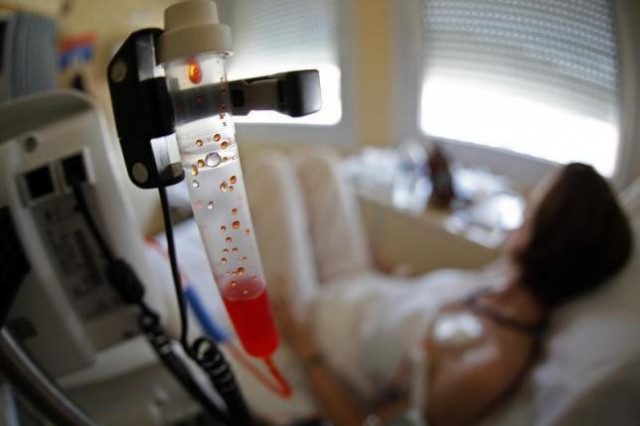Study shows low-dose chemo keeps cancer under control
The new approach delivers continuous low-dose chemotherapy that stabilizes the tumor

PHOTO: REUTERS
The study was done on mice with breast cancer, according to the report in Science Translational Medicine, and is part of a growing movement in oncology to explore alternatives to high-dose chemo and its often toxic side effects.
World Cancer Day: 90% cancers curable if diagnosed in time: expert
"Our results suggest that this adaptive therapeutic strategy... can result in prolonged progression-free survival in breast cancer," said the study, authored by Pedro Enriquez-Navas and colleagues at the H. Lee Moffitt Cancer Center and Research Institute in Tampa, Florida.
Some researchers question the use of standard chemotherapy because it rarely wipes out cancer entirely, and leaves behind drug-resistant cells that can take over and lead to an explosion in tumor growth.
The new approach delivers continuous low-dose chemotherapy -- in this case paclitaxel -- that stabilizes the tumor by "maintaining a small population of drug-sensitive tumor cells to suppress the growth of resistant cells," said the study.
Standard doses of paclitaxel in mice shrunk breast tumors, but these tumors grew back once the treatment ended.
"Another treatment regimen that skips doses whenever the tumor shrunk also inevitably resulted in tumor progression," said the study.
"In contrast, adaptive therapy consisting of high initial drug doses followed by progressively lower doses as the tumor responded was more effective in controlling tumor growth than either standard therapy or dose skipping."
The study found that 60 to 80 percent of the mice treated by adaptive therapy could be "weaned off the drug completely without relapsing for an extended period of time."
Early detection seen as key to beating breast cancer
More research is needed before the approach can be recommended for use in people.
However, the research offers "a very good possibility for future therapies," Giannoula Klement, of the Tufts University School of Medicine in Boston, wrote in an accompanying editorial.
"More and more oncologists are engaging some version of this approach."



















COMMENTS
Comments are moderated and generally will be posted if they are on-topic and not abusive.
For more information, please see our Comments FAQ